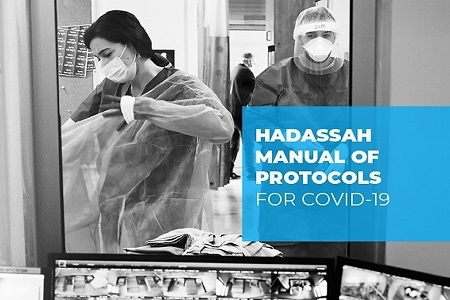
Within the framework of an international cooperation that extends to several countries in South America and around the world, Hadassah International and the Hadassah Medical Organization in Jerusalem presented the manual to the Argentine Health Commission of the Lower House of the Chamber of Deputies on July 2, 2020.
Deputy Dr. Pablo Yedlin, President of the Health Commission of the Honorable Chamber of Deputies in Argentina stated that “For the Argentinian Congress it is an honor to receive you in our house and extend our appreciation for this collaboration that does not end with this material that you are giving us. It begins and opens the doors to a more important collaboration.”
In the presence of the president of the Health Commission of the Honorable Senate of Argentina, Mario Fiad; Deputy Carmen Polledo, Vice President of the Health Commission added, “We are going through this pandemic. We are going through this first complex stage with the hope of moving forward. These are the moments when pettiness must be put aside and we must all work together to fight against COVID-19.”
The participation of the Israeli ambassador, Galit Ronen, in this Hadassah event highlighted the strong collaborative relationships between Israel and Argentina. Ambassador Galit stated, “In these difficult times, actions towards unity are important. The relations between Argentina and Israel have never been as good as at this moment.”
Representing the Hadassah Medical Organization on the Zoom conference, Jorge Diener, Associate Director of Hadassah International stated: “Today, at this critical time, Hadassah is sharing with the world the experience and knowledge it has gained over the past few months and can provide some answers to COVID-19 that can generate the different solutions needed in each location.”
He explained how the manual could help the Argentinian government deal with the COVID-19 pandemic. The manual is a compilation of medical guidelines and protocols essential for handling the coronavirus, as well as providing information on general health care during the pandemic.
Diener continued, “Hadassah believes that sharing the experience gained by our dedicated hospital staff can be of great benefit to our colleagues who are at the forefront of the battle against the virus in many parts of the world.”
This 65-page manual provides extensive details on what needs to be done from the moment a patient enters a facility until the time of discharge or death. A new chapter deals with safety measures that will be needed when surgical activity resumes in a hospital after the pandemic, as well as protocols to maintain general health care. Part of the manual was recently published in the prestigious Journal of Hospital Administration.
Hadassah has already shared its protocols with some nursing homes, hospitals, and health facilities in Argentina, but this presentation extended the cooperation to other provinces.
Other Latin American countries that are using the Hadassah protocols include Peru, Paraguay, Chile, and Mexico. Available in English, Spanish, and Russian, the manual has also been shared with other countries including Australia, France, The United Kingdom, and Russia.
The event can be viewed below:
